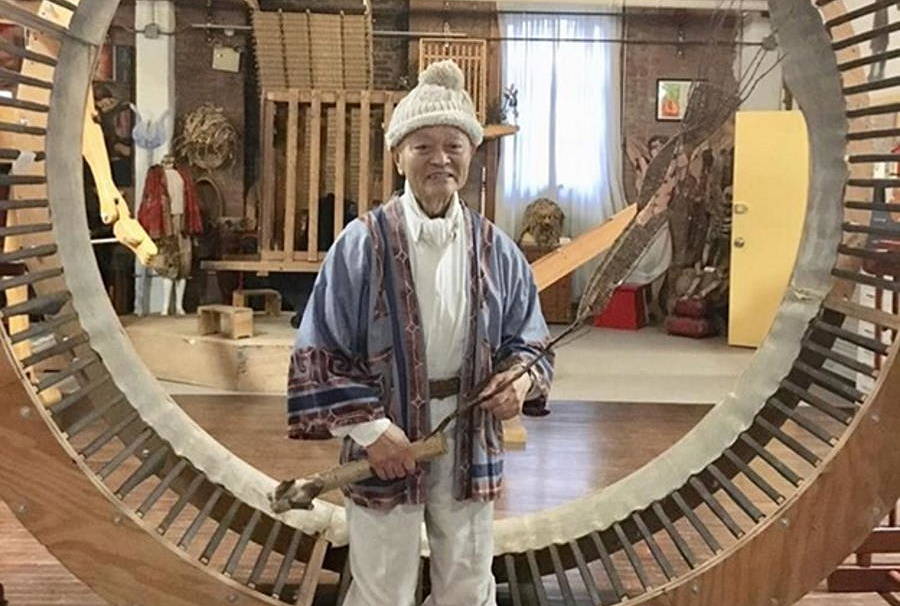Jun Maeda, the Obie-winning designer and resident set designer at La MaMa Experimental Theatre Club (ETC) since 1970, died on Monday, April 6, three days after his 79th birthday, at Mt. Sinai West Hospital in Manhattan. Maeda, whose career spanned 50 years, during which time he worked with a wide range of directors from Andrei Serban to Harvey Fierstein and Peter Brook, succumbed to the novel coronavirus, according to Mia Yoo, La MaMa’s artistic director.
Born in Miyagi, Japan, in 1941, Maeda graduated from Nihon University with a degree in agriculture and land development. He arrived in New York in 1970 as part of an international touring company of the Tokyo Kid Brothers and Shuji Terayama, leading Japanese experimental theatre companies. He went to work almost immediately as a much-sought-after scenic designer, starting with several productions directed by Andrei Serban: Medea, Electra, The Trojan Women, The Good Woman of Setzuan, and As You Like It. He subsequently worked on productions directed by Peter Brook and Tadeusz Kantor. He designed the set of Safe Sex, directed by and starring Harvey Fierstein, and The Caucasian Chalk Circle, directed by Fritz Bennewitz. He also designed major works by La MaMa founder Ellen Stewart (Mythos Oedipus, Orfei) Joseph Chaikin (Tourist and Refugees Part 1 and 2, Trespassing, Lies and Secrets, Re-Arrangements), John Caird (Waiting for Godot), Linda Mussman (The Birds), and John Jesurun (Black Maria), along with Jean Claude Van-Itallie’s groundbreaking Tibetan Book of the Dead and The Tempest.
Said Serban of his late colleague, “Maeda was one of a kind. Since he arrived at La MaMa, soon after me, he seemed from the beginning a mystery man and somehow remained so, and now took that mystery away with him. But no one was more dedicated, more modest, more unobtrusive. No one was more gifted. Only he could discover the magic in a Coca-Cola can or build with gracious mini-tools the epic Trojan Women slide! He could have been one of the anonymous genius craftsmen who built the pyramids. Lived like a pilgrim or a monk, always ready to serve the higher than himself. Never looking for rewards, never taken by usual egoistic wishes. He did for us what he had to do with all his heart and all his might, with attention, presence and love. And exquisite taste. Shakespeare says: ‘There is infinitely more than meets the eye’. I am not sure if Maeda ever heard these words, but the way he lived embodied them.”
Mia Yoo remarked, “Jun Maeda was a La MaMa treasure and one of the pioneers of experimental theatre. He was a master artist whose vision was transcendent and essential to the unparalleled body of work that was being done in the early days of experimental theatre. His singular work and creative spirit continued up to his death, as will his influence on generations of theatre artists.”
Later in his career, Maeda designed a Japanese comedy production (kyogen) titled Sambaso, starring the renowned actor Mansaku Nomura, which was performed at the Avery Fisher pool at Lincoln Center. He also designed sets for the Talking Band and South Africa’s Roy Hart Voice Theater production of Furies at the Cathedral of St. John The Divine.
He was a member of La MaMa’s celebrated Great Jones Repertory and his designs were seen again in the company’s December 2019 revival of The Trojan Women. He received the Village Voice Obie Award for Outstanding Work in the Theatre in 1981. His designs also earned him a Maharam Award for Theatre Design and a Villager Award.
Examples of Maeda’s body of work, including sculptures fashioned from recycled and found materials such as aluminum, paper, styrofoam, wood, and plastic, are on display at the La MaMa Archives (66 E. 4 St.), which will be reopened to the public (by appointment) following the current stay-at-home restrictions.


